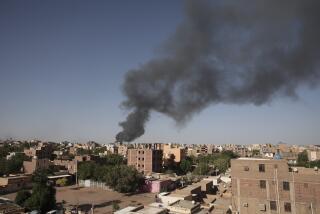Bosnians Await GIs With Mix of Hope and Worry
- Share via
TUZLA, Bosnia-Herzegovina — Selim Beslagic, the mayor of Tuzla, is a hopeful man.
With 20,000 U.S. troops about to descend on his city on a peacekeeping mission, Beslagic anticipates jobs for his weary people, repairs for his battered roads and schools, and business for the idle cafes and restaurants of Tuzla.
But he also worries about prostitution, drugs, AIDS and other trouble that could come with this American invasion.
“We expect more good than bad,” the popular mayor said shortly before traveling to Germany, where he planned to pick up a few more ideas by inspecting towns around U.S. military bases there.
This gloomy city of 110,000 people--plus an additional 50,000 war refugees--is about to become the headquarters for the U.S. Army’s 1st Armored Division on a mission to enforce a peace that many Bosnians are still hesitant to believe is real.
For many here, it is the prospect of U.S. soldiers--as distinct from discredited U.N. forces--that finally provides a glimmer of hope. But years of bloodshed, despair and disillusionment temper their enthusiasm.
Throughout the war, Tuzla has been the second-largest government stronghold after the capital, Sarajevo. It is a U.N.-designated “safe area” that, while somewhat isolated, never has come under siege like Sarajevo.
Shelled on several occasions, Tuzla nevertheless has escaped the wholesale destruction visited on Sarajevo and other Bosnian towns, and it is relatively stable, despite its large, bitter refugee population.
The city straddles the Jala River and is dotted with drab Communist-era apartment blocks and spiraling mosques, some of which date back 500 years to the Turkish occupation. The sound of the Muslim call to prayer wafts through the old part of the city at regular intervals.
Tuzla is a city of sinkholes, water rationing, smog and factories manufacturing rubber and chemicals that have been reduced to a fraction of their prewar production. Tuzla’s name comes from the Turkish word for salt. The town’s symbol is the goat.
“We view the Goat of Tuzla as its symbol of resistance and spite to all tyrants of this world and all troubles that may beset this town,” reads a city government brochure, “Tuzla: Where reason prevails.”
Many of Tuzla’s residents are eager for the economic boom that they believe the arrival of the GIs will create--like the American New Deal, Mayor Beslagic said.
He met last month with Maj. Gen. William Nash, the commander of the 1st Armored Division, who was in Tuzla on a get-acquainted visit. Beslagic said Nash promised to help open the roads that Tuzla needs to reach seaports and the highways that connected it to the rest of the former Yugoslav federation before the Bosnian Serb army cut them off.
Local authorities will have to get the traffic lights going to avoid accidents, Beslagic said. And then there’s the problem of the sinkholes.
Sections of Tuzla are sinking because of decades of uncontrolled salt mining that have left huge caverns underneath the city. The post office was swallowed, as were 7,000 homes and hotels, restaurants, libraries and shopping centers over several miles of city land. Part of Tuzla has sunk 17 yards since 1945, Beslagic said.
The salt mining has been ordered stopped, the mayor said, adding, “We hope this year we will stop sinking.”
Other Tuzlans are less optimistic that the U.S. deployment will bring prosperity or other major changes. An end to the fighting is likely, but whether it will last is not clear, they say.
“We just want the shooting to stop, and if they help with that, it’s fine,” said Fatima Ramic, who runs a vegetable stand at the Tuzla market with her husband, Halid. “But if they’re like the U.N., then we don’t need them.”
Her husband was more confident, saying, “If the Americans come, then the war is over.”
He conceded that he is a little nervous about his 16-year-old daughter, who he worries will become smitten with a GI.
A 10-member advance reconnaissance team from the 1st Armored Division arrived in Tuzla last week and has been scouting potential sites at which to set up shop. Tuzla was chosen for the U.S. deployment in part because it has a large air base, although flights were suspended in 1994 after Bosnian Serb gunmen shelled the runway.
Tuzla is also a city of refugees, its population swelled by the Bosnian Serb campaign of “ethnic cleansing” that has forced tens of thousands of Muslims from their homes in eastern and central Bosnia-Herzegovina.
Most recently, the Bosnian Serb takeover of the safe area of Srebrenica in July sent thousands of people fleeing to Tuzla.
“In a way, [the arrival of the American troops] makes us happy because the killing will stop,” said Sanela Spijadic, 21, who escaped Srebrenica with her mother but whose father and two brothers are among the 5,000 or so Muslim men who are still missing.
“But the war is not over for us, because we miss our families who could not escape.”
Sunday at the Korzo Cafe, half a block from the corner where 71 people were killed by a Bosnian Serb shell in May, young men smoked Camels and Marlboros and sipped beer while they discussed the imminent arrival of the GIs.
Visions of jobs and of soldiers spending their free time and extra money in Tuzla’s bars and restaurants warmed their hearts. But they admitted that they are a little worried about losing their girlfriends.
“Twenty thousand soldiers--that’s too much competition,” lamented Damir Mescic, a 21-year-old student.
More to Read
Sign up for Essential California
The most important California stories and recommendations in your inbox every morning.
You may occasionally receive promotional content from the Los Angeles Times.














